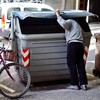
Lauren Frayer for NPR
At a Basque restaurant nestled in the green hills just outside the Spanish city of Bilbao, head cook Itziar Eguileor gestures toward a dumpster out back.
"This all used to go into the garbage," she says, lugging a huge pot of leftover boiled artichokes. "But now, these artichokes, we pack them in Tupperware, load them into our old Land Rover and drive them over to Solidarity Fridge."
Deliveries like Eguileor's arrive several times per day at the Solidarity Fridge, a pioneering project in the Basque town of Galdakao, population about 30,000. The goal is to avoid wasting perfectly good food and groceries. In April, the town established Spain's first communal refrigerator. It sits on a city sidewalk, with a tidy little fence around it, so that no one mistakes it for an abandoned appliance. Anyone can deposit food inside or help themselves.
This crusade against throwing away leftovers is the brainchild of Alvaro Saiz, who used to run a food bank for the poor in Galdakao.
"The idea for a Solidarity Fridge started with the economic crisis — these images of people searching dumpsters for food — the indignity of it. That's what got me thinking about how much food we waste," Saiz told NPR over Skype from Mongolia, where he's moved onto his next project, living in a yurt and building a hospital for handicapped children.
Saiz says he was intrigued by reading about a scheme in Germany in which people can go online and post notices about extra food and others can claim it.
But Saiz wanted something more low-tech in his hometown of Galdakao — something accessible to his elderly neighbors who don't use the Internet. So he went to the mayor with his idea for a Solidarity Fridge.
"When he came to city hall with this idea, I thought it was both crazy and brilliant! How could I say no?" says Mayor Ibon Uribe. "We approved a small budget of 5,000 euros [about $5,580] right away to pay for the fridge and an initial health safety study, as well as electricity and upkeep. And we granted this fridge a special independent legal status, so that the city can't be sued if someone gets sick."
There are rules: no raw meat, fish or eggs. Homemade food must be labeled with a date and thrown out after four days. But Javier Goikoetxea, one of the volunteers who cleans out the fridge, says nothing lasts that long.


No comments:
Post a Comment